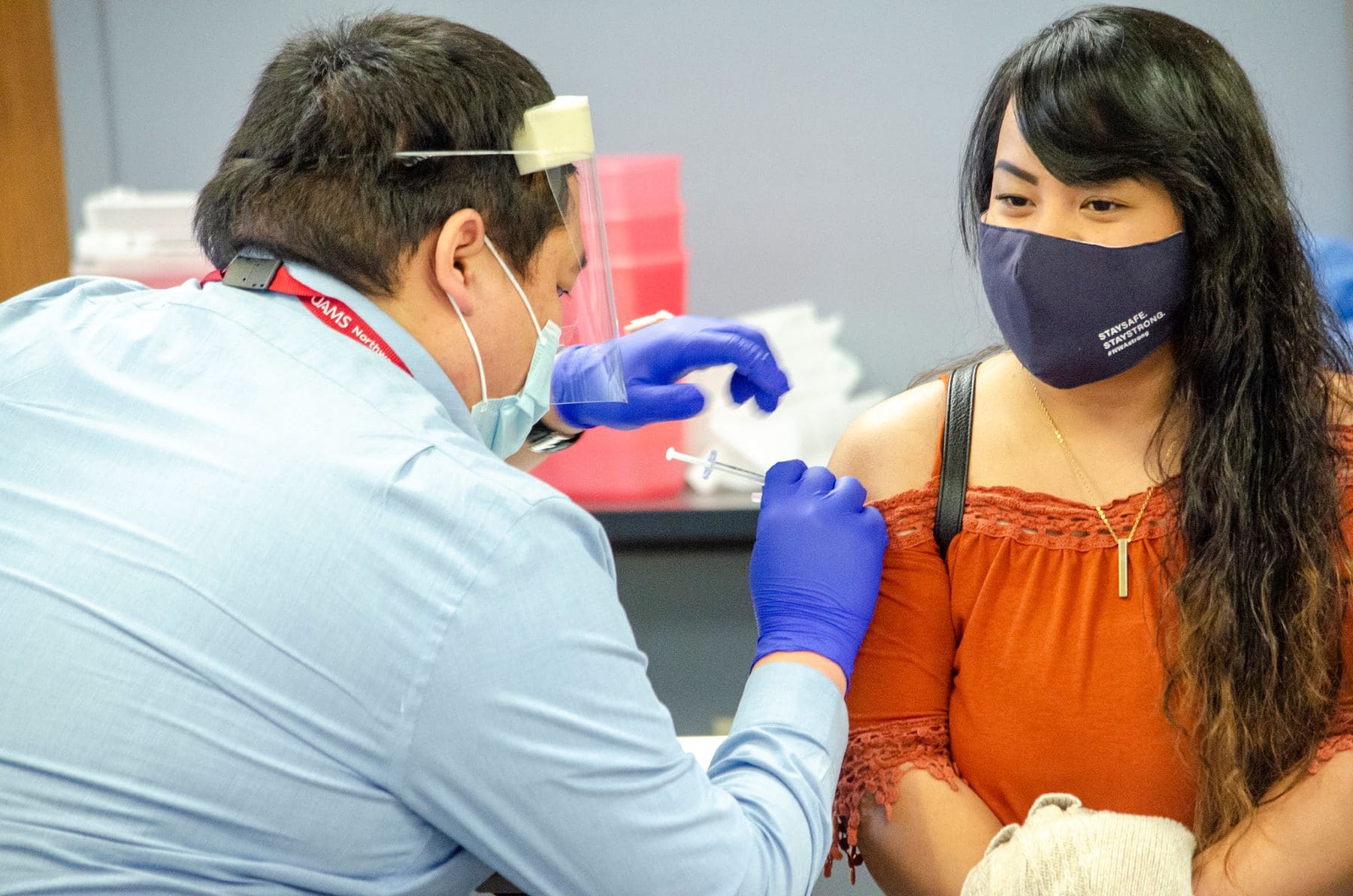View Larger Image

A Marshallese resident in Northwest Arkansas receives a COVID-19 vaccine.
UAMS Project Part of National Effort to Reduce COVID-19 in Hardest Hit Populations
| LITTLE ROCK — UAMS researchers and their community partners across Arkansas are studying the causes behind COVID-19’s devastating impact on minorities and developing plans to help increase vaccination rates.

UAMS Principal Investigators Pearl McElfish, Ph.D., MBA, Pebbles Fagan, Ph.D., MPH, and Laura James, M.D.
Supporting the one-year project is a $1.4 million grant from the National Institutes of Health (NIH) Community Engagement Alliance (CEAL) Against COVID-19 Disparities. UAMS was one of 11 teams selected as part of the national alliance.
Last year, Arkansas was identified by the Centers for Disease Control and Prevention (CDC) as a national hot spot for COVID-19 disparities among Marshallese and Hispanic populations. The disparities in percentage of cases, hospitalizations and deaths among these populations were so severe that CDC and NIH officials visited Northwest Arkansas to investigate.
Black/African American and rural communities across the state have been struck hard, too, said Pebbles Fagan, Ph.D., MPH, one of three principal investigators on the study.
“Aggressive steps are needed to protect Black/African American communities from COVID-19 because their life expectancy declined by nearly three years since 2019. This is alarming,” said Fagan, professor and director of the Center for the Study of Tobacco at the UAMS Fay W. Boozman College of Public Health. She is also director of Research for the Office of Health Initiatives and Disparities Research in the College of Medicine’s Department of Surgery and Winthrop P. Rockefeller Cancer Institute.
Also co-leading the study are:
- Laura James, M.D., director of the UAMS Translational Research Institute, associate vice chancellor for Clinical and Translational Research, and a professor in the College of Medicine Department of Pediatrics
- Pearl McElfish, Ph.D., MBA, director of the UAMS Office of Community Health and Research and associate director of Community Outreach and Engagement at the UAMS Winthrop P. Rockefeller Cancer Institute. She is the outgoing vice chancellor for the UAMS Northwest Regional Campus. She also leads the Special Populations Core for the Translational Research Institute.
The UAMS CEAL Team project is titled, “COVID-19 PREVENT (Partnership for Rapid Engagement to Enhance Vaccine uptake for Everyone: Neighbors Working Together) Project.”
Critical to the project’s success will be leveraging a network of UAMS community partners representing more than 150 health clinics, community groups and faith-based organizations, McElfish said.
“UAMS has built broad grassroots community partnerships, and we’ll use that to develop and deploy effective strategies to help people better understand the virus and vaccines,” she said. “We’ll also develop methods for improving both trust and access to vaccines.”
“The entire CEAL team is very happy that we have longstanding relationships with many partners who are ready to ramp up existing efforts so that we can reduce COVID-19 related illnesses, disability and deaths,” Fagan said.
Researchers will use a survey of Arkansans to aid the development of their intervention strategies.
“We need to better understand and address the factors contributing to the disproportionate burden of COVID-19 in minority communities,” James said. “We expect the information we gather, as part of a broad collaboration with our community partners, will help produce strategies for minority and underserved communities to better cope with future pandemics.”
“We want to make sure that Black/African American, Hispanic/Latino and Marshallese, and rural residents have access to trustworthy information to inform their decision-making about getting a vaccine,” Fagan said. “We want to make sure they receive equitable health care treatment and have easy access to a vaccine today and five years from now.”
Other UAMS researchers involved in the project are:
- Keneshia Bryant-Moore, Ph.D., FNP-BC, associate professor, Department of Health Policy and Management, College of Public Health
- Carol E. Cornell, Ph.D., professor and chair, Department of Health Behavior and Health Education, College of Public Health
- Geoffrey Curran, Ph.D., professor, Department of Pharmacy Practice, College of Pharmacy; director, Center for Implementation Research
- Margarete Kulik, Ph.D., assistant professor, Department of Health Behavior and Health Education, College of Public Health
- Elaine Prewitt, Dr.P.H., associate professor, Department of Health Policy and Management, College of Public Health
- Sheldon Riklon, M.D., associate professor, Department of Family and Preventive Medicine, College of Medicine
- James Selig, Ph.D., associate professor, Department of Biostatistics, College of Medicine
- Kate Stewart, M.D., professor, Department of Health Policy and Management, College of Public Health; director, Office of Community-Based Public Health; director, Community Engagement, Translational Research Institute
- Mark Williams, Ph.D., professor and dean, College of Public Health